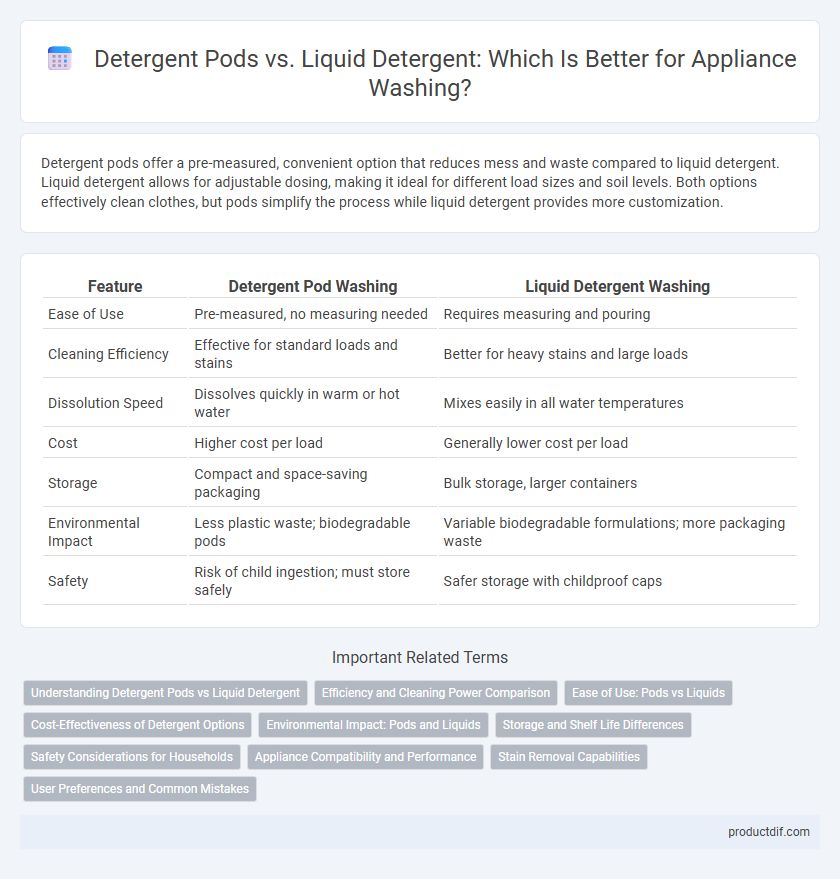Detergent pods offer a pre-measured, convenient option that reduces mess and waste compared to liquid detergent. Liquid detergent allows for adjustable dosing, making it ideal for different load sizes and soil levels. Both options effectively clean clothes, but pods simplify the process while liquid detergent provides more customization.
Table of Comparison
| Feature | Detergent Pod Washing | Liquid Detergent Washing |
|---|---|---|
| Ease of Use | Pre-measured, no measuring needed | Requires measuring and pouring |
| Cleaning Efficiency | Effective for standard loads and stains | Better for heavy stains and large loads |
| Dissolution Speed | Dissolves quickly in warm or hot water | Mixes easily in all water temperatures |
| Cost | Higher cost per load | Generally lower cost per load |
| Storage | Compact and space-saving packaging | Bulk storage, larger containers |
| Environmental Impact | Less plastic waste; biodegradable pods | Variable biodegradable formulations; more packaging waste |
| Safety | Risk of child ingestion; must store safely | Safer storage with childproof caps |
Understanding Detergent Pods vs Liquid Detergent
Detergent pods offer precise dosing and convenience by combining detergent, stain removers, and brighteners in a single, pre-measured unit, reducing the risk of detergent overdose and residue buildup. Liquid detergents provide flexibility in dosage adjustments and are effective for pre-treating stains and customizing wash cycles, especially in varying load sizes and water hardness. Understanding the formulation differences, such as concentrated surfactants in pods versus customizable liquid volumes, is essential for optimizing cleaning performance and appliance longevity.
Efficiency and Cleaning Power Comparison
Detergent pods offer a pre-measured dose of concentrated cleaning agents that dissolve quickly, enhancing efficiency by reducing waste and simplifying the laundry process compared to liquid detergents. Liquid detergents allow for adjustable dosing, which can be more economical for varying load sizes and soil levels, but may result in overdosing and residue if not measured properly. Studies indicate that both formats provide comparable cleaning power on common stains, though pods may excel in cold water cycles due to their formulated composition.
Ease of Use: Pods vs Liquids
Detergent pods offer superior ease of use with pre-measured doses that eliminate measuring and reduce mess, making laundry faster and more convenient. Liquid detergents require manual measuring, increasing the risk of spills and overdosing, which can complicate cleaning routines. Pods also simplify storage and portability, enhancing user experience in everyday appliance use.
Cost-Effectiveness of Detergent Options
Detergent pods often provide a cost-effective solution by offering pre-measured doses that minimize waste and optimize cleaning efficiency, which can lead to savings over time compared to liquid detergent. Liquid detergents, while sometimes cheaper per bottle, require careful measuring to avoid overuse, potentially increasing overall expenditure. Consumers aiming for budget-friendly appliance maintenance should consider pods as they balance cost with convenience and consistent performance.
Environmental Impact: Pods and Liquids
Detergent pods reduce plastic waste by using minimal packaging compared to bulky liquid detergent bottles, easing environmental burden. Liquid detergents often contain higher levels of phosphates and chemicals that can harm aquatic ecosystems during wastewater discharge. Pods are precisely pre-measured, minimizing detergent overuse and reducing chemical runoff, contributing to a lower ecological footprint overall.
Storage and Shelf Life Differences
Detergent pods are compact, pre-measured, and sealed in water-soluble film, offering longer shelf life when stored in airtight containers away from moisture. Liquid detergents require tightly sealed bottles and typically have a shorter shelf life due to susceptibility to mold and separation over time. Proper storage conditions, such as cool, dry environments, significantly extend the effectiveness of both detergent forms but favor pods for convenience and longevity.
Safety Considerations for Households
Detergent pods offer pre-measured convenience but pose higher risks of accidental ingestion, especially in households with children or pets, necessitating secure storage and childproof packaging. Liquid detergents, while less concentrated, require careful handling to avoid spills and skin contact, which can cause irritation. Both forms demand strict adherence to usage guidelines and safety precautions to minimize household chemical hazards effectively.
Appliance Compatibility and Performance
Detergent pods offer precise dosing and are compatible with most modern washing machines, reducing the risk of overuse and residue buildup, which optimizes appliance longevity and performance. Liquid detergents provide more flexibility in dosage but may cause excess sudsing in high-efficiency washers, potentially impacting appliance efficiency and requiring extra rinse cycles. Choosing the correct detergent type tailored to the washing machine's specifications ensures optimal cleaning performance and appliance protection.
Stain Removal Capabilities
Detergent pods provide a concentrated formula that can effectively target tough stains by releasing pre-measured amounts of cleaning agents during the wash cycle. Liquid detergents offer flexibility in dosing, allowing for adjustments based on fabric type and stain severity, which can enhance stain removal on heavily soiled garments. Studies show that pods excel in convenience and consistency, while liquid detergents perform better in soaking and pretreating stains before washing.
User Preferences and Common Mistakes
Detergent pod washing appeals to users seeking convenience and precise dosing, while liquid detergent allows customizable amounts for varying load sizes and stain levels. Common mistakes with pods include using multiple pods per load or adding them in the wrong compartment, leading to poor dissolution and residue. Liquid detergent errors often involve overuse, which can cause excess suds, damage to washing machines, and inadequate rinsing.
Detergent Pod Washing vs Liquid Detergent Washing Infographic

 productdif.com
productdif.com